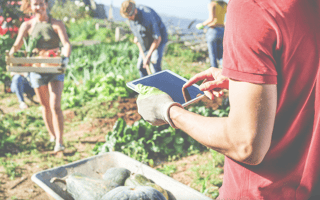How do you judge the impact of your work?
For many, it might be easier to not even try. Tallying up the point of every email, meeting, deliverable and project can feel like a lesson in futility for employees who feel disconnected to their company’s purpose.
Luckily, that’s not the reality for the team at Barn2Door. The company’s mission is straightforward enough: it aims to make it easier for consumers to buy sustainable, high-quality food from local farms. It’s a pretty easy goal to get behind. Yet for the engineering team, the meaning of their work runs deeper than just connecting city dwellers with organic vegetables.
“What we do affects all of us,” Andrew Smith, a software engineer at the company, said. “There’s nobody who is exempt from farmers’ success. When they’re successful, we all have better food. And supporting more sustainable practices means more improvements to our environment. It’s a snowball effect.”
It’s little wonder, then, that the team has created a new term for the work they do: impact engineering. Instead of referring to a methodology or process, the term resonates culturally with every engineer, reminding them that each line of code they write or bug they crush has real implications for farmers, shoppers and the planet.
To find out more about impact engineering and the passion that powers Barn2Door’s team, Built In Seattle sat down with Smith, along with Lead Software Engineer Tim Kim and Software Engineer Allison Merth. They shared why their company’s tightly held mission encourages them to innovate, collaborate and take pride in their work, and how their team is sparking long-lasting change in cities across the United States.

How exactly does Barn2Door’s software help farmers?
Lead Software Engineer Tim Kim: Successful farms use Barn2Door to run their business. Our software enables farmers to have an e-commerce store under their own farm brand, as well as tools on the back end to easily manage their business, like orders, deliveries, inventory and more.
At the same time, we don’t just give them the software and tell them to figure it out. We have a very dedicated success team that includes onboarding, training and account management. They provide tips, metrics and guidance on how farmers can successfully run their businesses.
Software Engineer Andrew Smith: Farmers can have many specific needs, and sometimes they’re not the most tech-affectionate people. They’re in farming because they enjoy being outside, working with animals and nature, and tech isn’t necessarily a priority for them. Our job is to design a product that tailors to those who may be hesitant to immerse themselves in technology, or see it as a chore. We want to make our software inviting and a joy to use, while also saving them time and helping them capture more sales.
Before Barn2Door, most farmers would work off a Google doc or an Excel sheet, tracking everything manually. They would take orders via phone or email, with no tracking, no real-time inventory and no ability to quickly map delivery routes or sync finances. What we’re building automates all of that and more, from orders to inventory to generating pick and pack lists for delivery day. While their online store makes it easier for their buyers to shop, the automated workflows keep them organized and saves a ton of time. It’s a big weight off their shoulders.
Software Engineer Allison Merth: Farmers have so much complexity in their businesses: Everything is seasonal, and selling food is different than selling products that are shelf-stable. There are more edge cases to consider, and we’re aware that we need to work differently than a generic e-commerce platform.
Our product management team does a great job of talking with farmers and the farm account managers to uncover what features and capabilities would be most useful to farmers. We have to think about every possible situation or edge case from an engineering perspective, while also paying attention to how farmers are actually using the product.
MOVING THE NEEDLE IN A TECH STACK
- React
- Node.js
- Postgres
- AWS
- Redis
- Java Spring
Your team operates under something called “impact engineering.” Can you tell us what that is, and why it’s important to the work you do?
Smith: The industry-wide idea of purpose-built engineering essentially just means building software to solve a problem — it’s just a really generic definition we didn’t think had enough meaning. So we came up with the term “impact engineering.”
We think it captures the passion and intensity that we, as a team of engineers, share as we build software to positively impact farmers, eaters, the food system and the planet.
Merth: Our processes are pretty similar to other companies, but there’s something special about working on projects where we have a tangible impact. It makes me care more about what I’m working on, and I put a lot more effort into my work than I would if I didn’t understand what the product was being used for.
I really enjoy it when we release a feature and then a quote from a farmer is shared in Slack about how much they love it. It’s also fun to work on software that I want to use as a consumer! I'm actually part of a CSA (a food box subscription) that I got through Barn2Door and it’s awesome.
Subscribing to a healthier lifestyle
What’s a recent launch you’re proud of? What was the impact of it?
Merth: I work mostly on the subscriptions feature on our platform, which we built from the ground up. One semi-recent release was for “late enrollment.”
For most CSAs, if you don’t sign up in time, you are “too late” to join and have to wait weeks to sign up for the next subscription. But with this new release, even if the buyer doesn’t get there in time to sign up for the entire 10 weeks, they can still join a few weeks in. It actually made a big impact because farmers can make more money, move more product and buyers can sign up at any time.
Kim: Another launch we had recently were our pick and pack lists. A pick list is a list of things the farmer has to pull (from the fields or freezer) for all orders on a given delivery day. A pack list is the list of items in each customer’s order (e.g. to go into a box or bag) to pack for a given delivery day. Our pack lists also have a direct one-button integration into a routing app, so driving routes are automatically generated for our farms. One farm recently reported they saved 35 percent on their gas bill alone, thanks to better routes.
I think the coolest part about this feature is that we support dynamic exports of the pick and pack lists, so farmers can export these lists easily as PDFs or CSVs. We also support generating and printing labels, so farmers can attach labels to their delivery packages. It’s a lot of automation for what the farmer would once have had to do manually to fulfill and deliver their orders.
From the farmer’s mouth
Aside from the impactful product you’re building, what do you find rewarding about working at Barn2Door?
Kim: I enjoy working here because there’s a higher degree of ownership and innovation we’re empowered to have as engineers. For example, when you work at a big tech company, everything has more or less already been built — maybe even 10 years ago. What those engineers are doing now is adding onto that existing system. Those firms may also lack the impact engineering aspect we have.
At Barn2Door, we’re able to make new systems from the ground up, which is relatively unique. We’re architecting these huge systems, and we need them to be scalable and last decades. We also need them to be maintainable by any engineer, not just us. Any intern should be able to look at it and maintain it in a reasonable fashion. We have the agency to assess the pros and cons of what we’re building and make sure that it’s going to be something that is here to stay.
Merth: As a non-lead engineer, I feel like my ideas are very much listened to. We’re never given an assignment and told there is only one way to do it — there is always back and forth dialogue to figure out the best way to build something. When we start a new feature, we create a document, to plan how we’re going to build it. People provide a lot of input into that document, which builds on itself and allows us to create cool things.
Culture is important here, and not just on the engineering team. You feel connected to other departments, and leadership really tries to build a culture of collaboration and a passion for helping farmers. You feel like you’re a part of something big.










